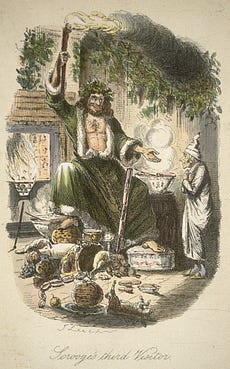|
 |
The Writer's Almanac from Monday, December 25, 2006
"Rejoicing with Henry" by Maxine Kumin, from Selected Poems: 1960-1990. © W.W. Norton.
It's the birthday of scientist and physicist Sir Isaac Newton, born in Woolsthorpe, Lincolnshire, England (1642). As a professor of mathematics, Newton made discoveries about the nature of light and color, and he developed a more advanced telescope. But then he began to think about why planets travel in orbits around the sun, and why they never stopped. Those questions resulted in his laws of motion: that an object in motion tends to stay in motion, an object at rest tends to stay at rest, and that every action has an equal and opposite reaction.
He said, "If I have seen further than others, it is by standing on the shoulders of giants."
Today is Christmas Day. About 96 percent of Americans say that they celebrate Christmas in one way or another; but Christians didn't start celebrating Christmas until the fourth century A.D. Apparently, the earliest Christians weren't nearly as interested in Jesus' birth as they were in his resurrection from the dead. Historians believe that the Gospel of Mark was the first Gospel to be written about Jesus, around 50 A.D., and it doesn't even mention Jesus' birth. It starts with his adult baptism.
Only the Gospels of Luke and Matthew tell the story of Jesus' birth, and they give slightly different accounts. In the Gospel of Luke, an angel appears to Mary to tell her that she will give birth to the Son of God. In the Gospel of Matthew, it is Joseph who learns in a dream that Mary is pregnant with the Son of God.
The Gospel of Luke tells the story of how Mary and Joseph went to the city of Bethlehem because of the Roman census, and since there was no room at the inn, they were forced to take shelter in the barn, where Jesus was born, wrapped in swaddling clothes and laid in a manger. The Gospel of Matthew tells how a group of wise men go to find the baby that has been prophesized as the future king of the Jews. They follow a bright star in the East until they find Jesus, and they offer him gifts of gold, frankincense and myrrh.
Christian bishops only began to celebrate Jesus' birth after a great debate over how human Jesus had really been. Some Christians believed he was just a spirit, with no body at all. But after much discussion, the church in Rome took the official stance that Jesus had possessed a real human body. Scholars believe that the church began celebrating Jesus' birth as a way of emphasizing his bodily humanity. The first mention of a Nativity feast appears in a Roman document from 354 A.D., and that document is the first to list December 25 as his official birthday.
No one knows exactly why the date of December 25th was chosen, but it was probably because December 25th was the date set for a Roman festival honoring the sun god Mithras. It also coincided with the pagan festival of Saturnalia, which was widely celebrated throughout the Roman Empire.
Unfortunately for the church, Saturnalia was usually celebrated with drunken revelry. And for Christians, for the next thousand years or so, Christmas became the wildest party of the year. There were huge feasts and street parties that often led to riots. It was writers who helped turn Christmas into more of a domestic holiday. The poem "The Night Before Christmas," published in 1823, was one of the first works of literature to suggest that Christmas should be focused more on children than adults. And Charles Dickens's novel A Christmas Carol, in 1843, helped popularize the idea that Christmas should be about family.
Be well, do good work, and keep in touch.®
We’re taking the show on the road! For a complete list of Garrison Keillor’s schedule, click here!We’d love to see you!
If you are a paid subscriber to The Writer's Almanac with Garrison Keillor, thank you! Your financial support is used to maintain these newsletters, websites, and archive. If you’re not yet a paid subscriber and would like to become one, support can be made through our garrisonkeillor.com store, by check to Prairie Home Productions, P.O. Box 2090, Minneapolis, MN 55402, or by clicking the SUBSCRIBE button. This financial support is not tax deductible.


